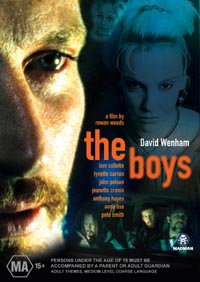The Boys (1998 film)
 From Wikipedia the free encyclopedia
From Wikipedia the free encyclopedia
| The Boys | |
|---|---|
 The Boys DVD cover | |
| Directed by | Rowan Woods |
| Screenplay by | Stephen Sewell |
| Based on | The Boys by Gordon Graham |
| Produced by | Robert Connolly John Maynard |
| Starring | David Wenham Toni Collette Lynette Curran John Polson Anthony Hayes |
| Cinematography | Tristan Milani |
| Edited by | Nick Meyers |
| Music by | The Necks Alan Lamb |
| Distributed by | Roadshow Entertainment |
Release date |
|
Running time | 86 minutes |
| Country | Australia |
| Language | English |
The Boys is a 1998 Australian drama film directed by Rowan Woods. The screenplay by Stephen Sewell is based on the play by Gordon Graham, with Graham influenced by the 1986 murder of Anita Cobby,[1] with the play first performed by Griffin Theatre Company under the direction of Alex Galeazzi.
Plot[edit]
After serving time in prison for an assault on a liquor store employee, Brett Sprague is released from prison and returns home to his two brothers and their girlfriends, mother and stepfather. Things have changed, and as Brett begins to drink his way through the day, he regains his "top-dog" position one argument at a time. This power trip gets Brett and his brothers united in rage against their girlfriends and mother, and they are involved in a heinous crime. The aftermath of the night unfolds through the story with flashforwards.
Cast[edit]
- David Wenham – Brett Sprague
- Toni Collette – Michelle
- Lynette Curran – Sandra Sprague
- John Polson – Glenn Sprague
- Anthony Hayes – Stevie Sprague
- Jeanette Cronin – Jackie
- Anna Lise Phillips – Nola
- Pete Smith – George
- Sal Sharah – Nick
- Peter Hehir
Production[edit]
The Boys is Rowan Woods' directorial debut, and actor Peter Hehir's last film before he retired from acting. Woods "aimed to achieve a combination of documentary-style naturalism with the edge of a thriller." Woods also said that the first time he read the play, he felt "it was an Australian story that had to be told. (…) This is the inside story of a family in crisis, of three boys on the day before a nasty crime takes place, of which they are accused."[2]
The producer of the film, Robert Connolloy, had also produced the play. He met Rowan Woods at film school, and they both suggested to John Maynard they make the movie. The script was adapted by playwright Stephen Sewell.[3]
Shooting was done on location in a rented house in Maroubra, one of Sydney's Eastern Suburbs. The location used to shoot the scene of the heinous crime was filmed at the Eastlakes Shopping Centre in Eastlakes, another eastern suburb.
Accolades[edit]
The original music score is composed by The Necks, with other music contributed by sound designer Alan Lamb.[4][5]
| Award | Category | Subject | Result |
|---|---|---|---|
| AACTA Awards (1998 AFI Awards) | Best Film | Robert Connolly | Nominated |
| John Maynard | Nominated | ||
| Best Direction | Rowan Woods | Won | |
| Best Adapted Screenplay | Stephen Sewell | Won | |
| Best Actor | David Wenham | Nominated | |
| Best Actress | Lynette Curran | Nominated | |
| Best Supporting Actor | John Polson | Won | |
| Anthony Hayes | Nominated | ||
| Best Supporting Actress | Toni Collette | Won | |
| Best Cinematography | Tristan Milani | Nominated | |
| Best Editing | Nick Meyers | Nominated | |
| Best Original Music Score | The Necks | Nominated | |
| Best Sound | Peter Grace | Nominated | |
| Phil Judd | Nominated | ||
| Sam Petty | Nominated | ||
| Best Costume Design | Annie Marshall | Nominated | |
| ASSG Award | Best Location Recording | Peter Grace | Won |
| Serge Stanley | Won | ||
| Michael Taylor | Won | ||
| Berlin International Film Festival | Golden Bear[6] | Rowan Woods | Nominated |
| FCCA Awards | Best Film | Robert Connolly | Won |
| John Maynard | Won | ||
| Best Director | Roman Woods | Won | |
| Readers' Award for Favourite Australian Film | Won | ||
| Best Adapted Screenplay | Stephen Sewell | Won | |
| Best Actor | David Wenham | Nominated | |
| Best Supporting Actor | John Polson | Nominated | |
| Anthony Hayes | Nominated | ||
| Best Supporting Actress | Toni Collette | Nominated | |
| Lynette Curran | Won | ||
| Best Cinematography | Tristan Milani | Nominated | |
| Best Music Score | The Necks | Nominated |
See also[edit]
References[edit]
- ^ Alexandra Heller-Nicholas (2011). Rape-Revenge Films: A Critical Study. McFarland. p. 108. ISBN 978-0786486922.
- ^ "Wettbewerb/In Competition". Moving Pictures, Berlinale Extra. Berlin. 11–22 February 1998. p. 12.
- ^ "Interview with Rowan Woods", Signet, 12 May 1998. Retrieved 18 November 2012
- ^ Biron, D. 2013. The Aesthetics of Conservatism. Overland, 210, 72-77.
- ^ Mitchell, Tony. Minimalist Menace, UTS Publishing, 2005.
- ^ "Berlinale: 1998 Programme". berlinale.de. Retrieved 15 January 2012.
External links[edit]
- The Boys at IMDb
- The Boys at AllMovie
- The Boys at Oz Movies
- The Boys at Rotten Tomatoes
- The Boys at the National Film and Sound Archive